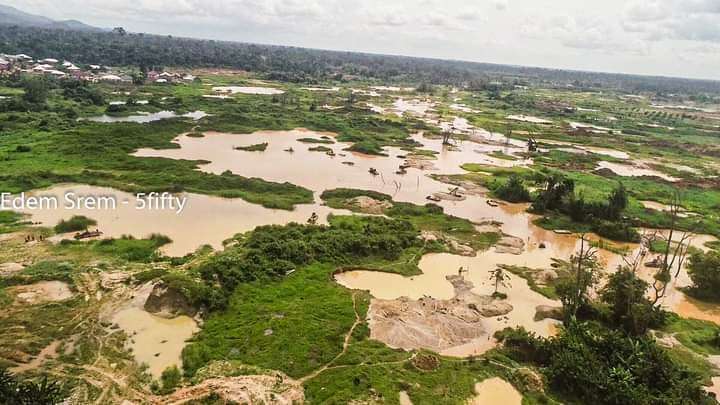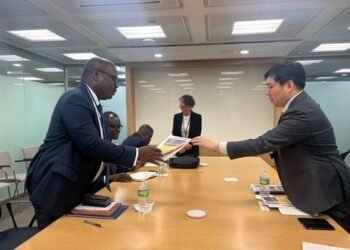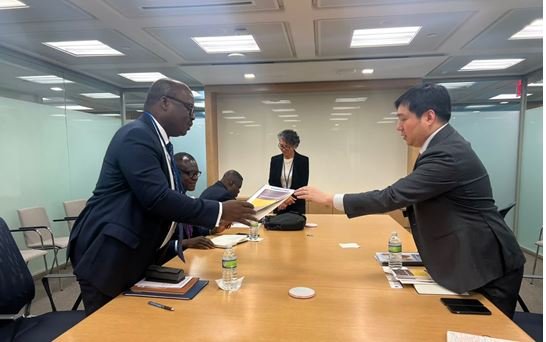As Ghana continues grappling with the environmental and social menace of illegal mining, popularly known as galamsey, concerns around water safety have surged to the forefront.
The impact of galamsey goes far beyond immediate environmental destruction as it has morphed into a threat to national development, posing grave risks to natural resources and public health.
Recent reports highlight polluted rivers and contaminated groundwater in mining regions, where chemicals from illegal mining operations infiltrate water sources that millions rely on.
In response to this urgent issue, the Democracy Accountability Hub (Democracy Hub), a local advocacy group dedicated to promoting governmental transparency and accountability, has formally petitioned the Food and Drugs Authority (FDA) for critical data regarding water quality standards in Ghana.
In an official request, Democracy Hub outlined a list of information demands to enhance public awareness of the safety protocols governing bottled and sachet water.
“Given the ongoing concerns about water quality in Ghana, particularly due to the impact of illegal mining (Galamsey) activities on our water bodies, and the critical importance of safe drinking water to public health, we write to request information about the quality standards, testing protocols, and safety measures implemented for bottled and sachet water products in Ghana”.
Democracy Accountability Hub
A System under Scrutiny: Request for Transparency
Democracy Hub’s request invoked the Right to Information Act, 2019 (Act 989), along with Article 21(1)f of the Ghanaian Constitution, which provides for citizens’ access to information.
The letter addressed the Information Officer at the FDA, demanding insights on water quality measures and certifications that bottled and sachet water producers must meet before reaching consumers.
The information request contained fifteen detailed points, including a complete list of licensed water bottling companies currently operating in Ghana, the FDA-approved purification processes, and the minimum criteria for certification.
The request further demanded the testing protocols for detecting heavy metals like mercury, arsenic, and cadmium in bottled and sachet water and a breakdown of heavy metal limits in drinking water according to FDA standards and how these compare to World Health Organization (WHO) guidelines.
It also requested records of the FDA’s inspection frequency at bottling facilities and the specific parameters monitored.

Public Health as a Priority: FDA’s Responsibility
Moreover, the petition sought to ascertain whether current FDA protocols are sufficiently stringent in addressing the unique challenges posed by galamsey-induced water contamination.
Beyond testing protocols, Democracy Hub also called for details on the FDA’s emergency response strategies for managing instances of contaminated water products found in the market.
Additional requests sought clarity on, the FDA’s monitoring of water sources used by bottling companies and internal quality testing and reporting requirements for water companies, particularly those sourcing water from high-risk areas.
Among others, the Democracy Hub request demanded data on any license suspensions or revocations due to quality breaches within the last two years.
The scope of Democracy Hub’s request underscores an attempt to lay bare the FDA’s oversight mechanisms in maintaining water safety standards, particularly as these pertain to heavy metals and other harmful contaminants that may enter water sources from mining-impacted areas.
“We would like the requested information in electronic format. The requested information can be sent to our email address at legal@democracyhubgh.org.
“However, in the event that you are unable to provide the information in electronic format, we are amenable to picking up the physical copy of the requested information; in or any other format that your Office deems appropriate”
Democracy Accountability Hub
The Health Hazard: Galamsey’s Legacy in Ghana’s Waterways
Illegal mining activities have been responsible for widespread water contamination across multiple regions in Ghana. The chemicals used in galamsey processes, primarily mercury and cyanide, seep into rivers and streams, contaminating the water table and leaving communities downstream vulnerable.
Studies have linked heavy metal exposure to chronic illnesses, affecting entire communities and endangering future generations. The Democracy Hub highlighted that access to safe drinking water is critical to safeguarding public health, especially in communities where galamsey activities are rampant.

The group’s letter emphasized the right of Ghanaians to know what measures the FDA and other relevant agencies have in place to protect the population from contaminated water.
“Pursuant to the provisions of Act 989, we would be grateful to receive the requested information within 14 days of the receipt of this letter. For any clarification to our request, kindly contact us via our email at legal@democracyhubgh.org. or failing that on this phone number at +233244220075”.
Democracy Accountability Hub
It is trite that transparency in these areas is essential, especially in light of rising consumer concerns about the safety of drinking water. Public confidence in water quality could be greatly bolstered—or severely damaged—based on the FDA’s response and subsequent measures to address these pressing questions.
This push for information is a clear reflection of growing civil society activism in Ghana. Democracy Hub’s efforts align with a broader movement among advocacy groups, environmentalists, and citizens who demand that regulatory bodies like the FDA prioritize accountability and transparency.
The effectiveness of Ghana’s Right to Information Act is also under a new test. Although this legislation theoretically provides Ghanaian citizens with access to public records, advocacy groups have reported challenges in obtaining timely responses from governmental bodies.
Should the FDA fail to provide the requested information within the stipulated 14-day timeframe, Democracy Hub is expected to pursue further legal action to enforce compliance.
The outcome of this request holds significant implications for both the FDA and water consumers across the country. In a climate where water scarcity and contamination are twin challenges, Ghanaians need clarity on the safeguards in place to protect their health.
The FDA’s response—or lack thereof—could either reinforce public trust in the quality control systems or expose regulatory gaps, particularly in industries operating in galamsey-affected areas.
READ ALSO: Gold Fields Gains 100% Ownership of Windfall Project in $1.39 Billion Osisko Deal


















